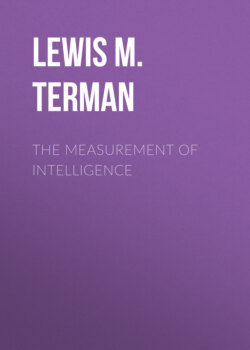Читать книгу The Measurement of Intelligence - Lewis M. Terman - Страница 19
На сайте Литреса книга снята с продажи.
The intelligence of superior children usually underestimated.
ОглавлениеTable of Contents
We have already mentioned the frequent failure of teachers and parents to recognize superior ability.[7] The fallacy here is again largely due to the neglect of the age factor, but the resulting error is in the opposite direction from that set forth above. The superior child is likely to be a year or two younger than the average child of his grade, and is accordingly judged by a standard which is too high. The following are illustrations:—
M. L. Girl, age 11–2; mental age “average adult” (16); sixth grade; school work “superior”; teacher’s estimate of intelligence “average.” Teacher credits superior school work to “unusual home advantages.” Father a college professor. The teacher considers the child accelerated in school. In reality she ought to be in the second year of high school instead of in the sixth grade.
H. A. Boy, age 11; mental age 14; sixth grade; school work “average”; teacher’s estimate of intelligence “average.” According to the supplementary information the boy is “wonderfully attentive,” “studious,” and possessed of “all-round ability.” The estimate of “average intelligence” was probably the result of comparing him with classmates who averaged about a year older.
K. R. Girl, age 6–1; mental age 8–5; second grade; school work “average”; teacher’s estimate of intelligence “superior”; social environment “average.” Is it not evident that a child from ordinary social environment, who does work of average quality in the second grade when barely 6 years of age, should be judged “very superior” rather than merely “superior” in intelligence? The intelligence quotient of this girl is 140, which is not reached by more than one child in two hundred.
S. A. Boy, age 8–10; mental age 10–9; fourth grade; school work “average”; teacher’s estimate of intelligence “average.” Teacher attributed school acceleration to “studiousness” and “delight in school work.” It would be more reasonable to infer that these traits are indications of unusually superior intelligence.
